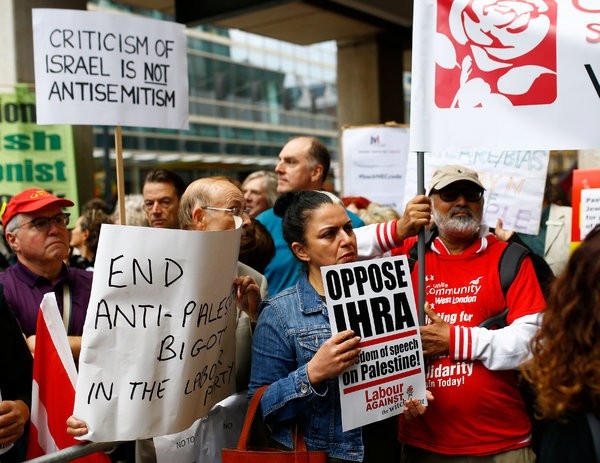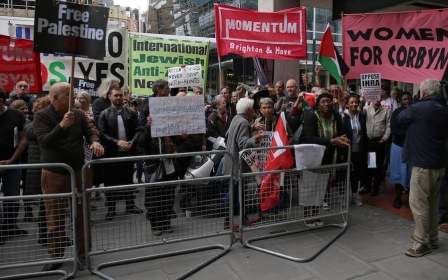Canada's third-largest city delays vote on contentious antisemitism definition

Canada's third-largest city has sent a motion to adopt a contentious definition of antisemitism to committee for further study, amid widespread concerns that the resolution would restrict criticism of Israel.
The Vancouver city council late on Tuesday sent a nonbinding resolution to adopt the International Holocaust Remembrance Alliance (IHRA) working definition of antisemitism to the city's Racial and Ethno-Cultural Equity Advisory Committee.
That effectively delayed a vote on the resolution that had been expected to take place this week.
"The City of Vancouver is committed to combatting all forms of hatred," said Vancouver city councillor Sarah Kirby-Yung, who introduced the resolution, in a statement before Tuesday's decision.
"The rapid rise in hate crimes in our city is alarming. We must stand together; antisemitism has no place here. I've heard from hundreds of Vancouverites who live with this. They deserve to feel safe and know their city stands with them."
New MEE newsletter: Jerusalem Dispatch
Sign up to get the latest insights and analysis on Israel-Palestine, alongside Turkey Unpacked and other MEE newsletters
The nonbinding resolution had been welcomed by pro-Israel groups in Canada, such as the Centre for Israel and Jewish Affairs (CIJA), as well as former justice minister Jody Wilson-Raybould, who is the MP for the Vancouver Granville district.
"Adopting @TheIHRA definition is a critical step in the fight against #antisemitism," Wilson-Raybould tweeted on 19 July.
The proposal also followed the federal government's inclusion of the IHRA definition in Canada's anti-racism strategy in June.
CIJA voiced its disappointment over the decision to delay the vote in Vancouver.
"Today's postponement of the motion to combat antisemitism is an unfortunate setback in the struggle against racism and bigotry," Nico Slobinsky, the group's director for the Pacific region, said in a statement.
But civil liberty groups and pro-Palestine activists across Canada have raised concerns about the IHRA definition, saying it would label criticism of the State of Israel as antisemitic - and have a chilling effect on advocacy.
Meghan McDermott, staff counsel at the British Columbia Civil Liberties Association (BCCLA), told Middle East Eye in an email on Monday that adopting the definition "is not helpful in protecting Jewish people from racism in Vancouver".
Instead, it "will actually be harmful in so far as it will chill political expression", she said.
It also is unclear how the motion would be applied, as it is "non-legally binding", but will be "considered as an 'additional practical tool' by the city, its police department, public library, park board and school board in identifying antisemitism", McDermott explained.
"The motion suggests that the definition will be operationalised in some way, and will consequently invite allegations of antisemitism against those who criticise Israel," she said.
The definition
The IHRA defines antisemitism as: "A certain perception of Jews, which may be expressed as hatred toward Jews. Rhetorical and physical manifestations of antisemitism are directed toward Jewish or non-Jewish individuals and/or their property, toward Jewish community institutions and religious facilities."
That can include "denying the Jewish people their right to self-determination, e.g., by claiming that the existence of a State of Israel is a racist endeavor", among other examples of antisemitism listed on the IHRA website.
"Applying double standards by requiring of it [Israel] a behavior not expected or demanded of any other democratic nation" is another example.
The definition is highly contentious, and it has been condemned by Palestine advocates worldwide.
But during the Vancouver city council meeting on Tuesday, Councillor Kirby-Yung defended the IHRA definition as "a tool" to combat antisemitism.
"It is not something that precludes free speech or legitimate political discourse, including criticism of political policies or countries," she said.
'The motion suggests that the definition will be operationalised in some way, and will consequently invite allegations of antisemitism against those who criticise Israel'
- Meghan McDermott, BC Civil Liberties Association
Still, it has raised alarm bells for many in Canada, including Independent Jewish Voices-Canada, a Jewish advocacy group that supports Palestinian rights.
In June, IJV-Canada said it "strongly rejected" the IHRA definition and its accompanying examples, which it said "conflate fundamental criticisms of Israel and/or Zionism with antisemitism".
Ottawa included the IHRA definition in its anti-racism strategy last month, but not the examples, IJV-Canada said in a statement.
"It is not at all clear," the group said, "whether the inclusion of the IHRA definition without its examples in the anti-racism strategy indicates that the definition has indeed been officially adopted" in Canada.
IJV-Canada instead urged Justin Trudeau's government to use a definition of antisemitism that is more in line with how it describes anti-black racism and Islamophobia in its anti-racism strategy document.
"The adoption of the full IHRA definition of antisemitism, including its examples, would pose a serious threat to freedom of expression and academic freedom in Canada," the group said.
'Checks on free speech'
That was echoed by Martha and Marty Roth, two Jewish-Canadian residents of Vancouver, who voiced their opposition to the city's motion in an opinion piece in The Georgia Straight earlier this month.
"The examples of antisemitism appended to the definition mostly concern criticisms of Israel rather than antisemitic statements, and thus, we believe, serve as serious checks on free speech," they wrote.
"Today, if we say that Israel has been engaged for 71 years in the brutal occupation of lands conquered in war and held in defiance of international law, that is protected speech, even if you disagree with it. Will it be a hate crime tomorrow?"
McDermott at the BCCLA added that adopting the definition is unnecessary, as Canada already has the tools "to hold people and organisations accountable for hate speech, hate crime, and for discrimination (under human rights laws) against Jewish people".
"We have been doing this and can continue to do so without having the IHRA definition of antisemitism adopted into Canadian legal standards," she said.
Middle East Eye delivers independent and unrivalled coverage and analysis of the Middle East, North Africa and beyond. To learn more about republishing this content and the associated fees, please fill out this form. More about MEE can be found here.




